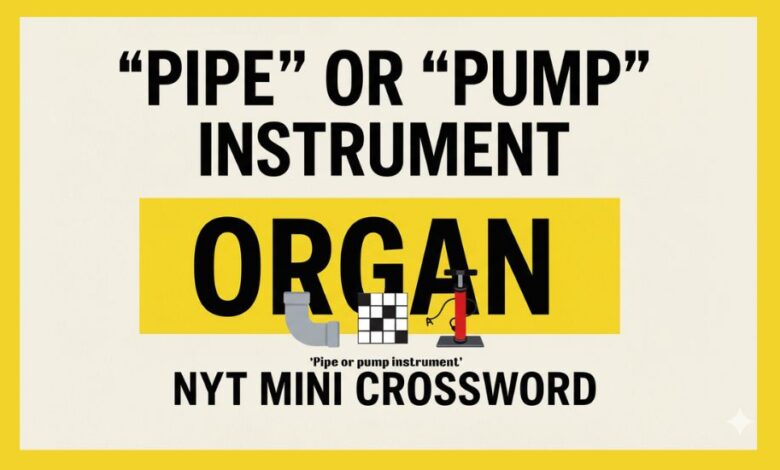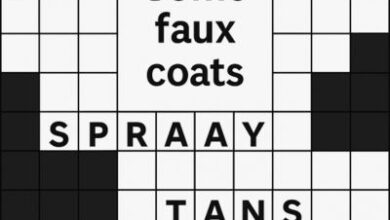“Pipe or Pump Instrument” – NYT Mini Crossword Clue: A Deep Dive

Crossword lovers know that every clue in The New York Times Mini Crossword hides a clever trick — sometimes it’s about meaning, sometimes about sound, and often, both. One such clue that caught the attention of word-game fans was “Pipe” or “pump” instrument.
At first glance, this clue looks simple. Two words — pipe and pump — and the category “instrument.” But, like many NYT Mini clues, the solution is packed with smart wordplay. Let’s explore what this clue means, why its answer makes perfect sense, and what it tells us about the artistry behind crossword creation.
The Clue and Its Answer
The clue “Pipe” or “pump” instrument appeared in the New York Times Mini Crossword of September 11, 2024.
The correct answer was ORGAN.
It fits perfectly because the word organ applies to both phrases in the clue:
- Pipe organ — a large musical instrument that produces sound by pushing air through pipes.
- Pump organ — a smaller, portable reed instrument that produces sound by pumping air with bellows.
In just five letters, the puzzle author connected two different but related instruments. That’s the kind of word precision and wit that the NYT Mini is known for.
Why “Organ” Is the Right Answer
If you take the clue literally, both “pipe” and “pump” modify “instrument.” The logical question becomes: What instrument can be described as both a pipe and a pump?
The only clear choice is organ — the family of instruments that includes both the pipe organ and the pump organ.
- A pipe organ works by sending pressurized air through pipes, each of which produces a specific note.
- A pump organ, sometimes called a reed organ or harmonium, uses bellows operated by foot pedals to push air through metal reeds, producing sound.
Thus, “pipe or pump” is a hint to the two varieties of the same broad musical category — the organ.
A Little Musical History
The organ is one of the oldest and most versatile musical instruments in human history. Its roots trace back more than two thousand years to the ancient Greek hydraulis, which used water pressure to push air through pipes. Over centuries, the organ evolved into two main branches:
- Pipe Organs – Giant instruments often built into cathedrals and concert halls. They have hundreds or even thousands of pipes of varying sizes and tones. The air is moved by bellows, which were originally hand- or foot-operated before mechanical blowers were introduced.
- Pump Organs (Reed Organs) – Smaller and more domestic instruments that became popular in the 19th century. They used hand or foot pumps to power the air through reeds rather than pipes. Because of their compact size, they were common in homes, schools, and churches without the means for a large pipe organ.
When the crossword says “pipe or pump instrument,” it elegantly refers to these two forms of the same musical concept — both driven by air, both called organs, and both integral to musical history.
The Clue’s Wordplay
The brilliance of the clue lies in its layered meanings. Crossword clues often work on multiple levels:
- Definition Level: It directly describes the instrument — one that is “pipe” or “pump.”
- Associative Level: Solvers familiar with the phrase “pipe organ” might instantly connect the word pipe with organ.
- Contrast Level: The use of “or” implies that either descriptor (pipe or pump) can lead to the same answer.
- Hidden Meaning: The word organ itself has another meaning — a body part, such as the heart or kidney. Crossword constructors often enjoy clues that hide a double meaning in plain sight.
In this way, the clue satisfies two types of solvers — those who think logically and those who think laterally.
Puzzle-Solving Strategies
If you encounter similar clues in NYT Mini or other crossword puzzles, here are a few strategies you can use:
- Focus on Word Families: If the clue connects two different words with “or,” look for an answer that can relate to both.
- Think of Common Phrases: “Pipe organ” and “pump organ” are both widely known phrases — combining their shared word points you to the solution.
- Consider the Answer Length: In this case, the puzzle grid required a five-letter word. That helps eliminate longer or shorter options.
- Check Cross Letters: In crosswords, every letter intersects with another word. Use those hints to confirm your guess.
- Remember Double Meanings: Words like organ can refer to musical instruments and biological terms, offering more clue flexibility.
The Art of Crossword Construction
Constructors of NYT Mini puzzles have to fit creativity into a very small space — usually a 5×5 grid. Every word and clue must be concise, yet interesting.
A clue like “Pipe or pump instrument” is elegant because:
- It uses only four words.
- It points to a familiar object without giving it away directly.
- It teaches something (the existence of “pump organs”) to solvers who might only know about pipe organs.
The Mini Crossword’s beauty lies in these subtle educational moments — a quick puzzle that can still make you learn something new.
Wordplay and Linguistic Layers
Another reason this clue is satisfying lies in the word organ itself.
- Linguistically, organ comes from the Greek organon, meaning “tool” or “instrument.”
- Over time, the word came to describe both musical tools and biological tools — body parts that perform vital functions.
Thus, the word organ is inherently about function — whether it’s producing music or sustaining life. That’s why it appears so often in word games and puzzles: it’s short, rich in meaning, and versatile.
How Solvers Reacted
Many crossword fans who encountered this clue online discussed it as a “smart but fair” example of NYT Mini clue writing. It’s a textbook example of what makes the Mini enjoyable — quick to solve, but clever enough to make you smile once you see the answer.
Solvers who initially thought of “pipe” as a verb or “pump” as something unrelated to music were pleasantly surprised when they realized the clue referred to types of instruments rather than actions. That aha! moment is exactly what crossword creators aim for.
Broader Relevance of “Organ” in Word Games
If you play word games like Wordle, Connections, or crossword variants, you’ve probably noticed the word organ pop up often. It’s short, vowel-heavy, and easy to fit into patterns. Beyond that, it has multiple meanings — perfect for game makers and solvers alike.
In crossword puzzles, organ can appear in different clue forms:
- “Church instrument” → ORGAN
- “Body part” → ORGAN
- “Pipe instrument” → ORGAN
- “Reed or pump instrument” → ORGAN
Understanding how words like organ work across different semantic fields helps solvers anticipate similar clues in the future.
Lessons for Crossword Writers
For those interested in writing crossword clues, this example offers key lessons:
- Keep It Concise: Four to five words can be enough if chosen carefully.
- Use Common Phrases: “Pipe organ” and “pump organ” are familiar terms, so combining them is fair to solvers.
- Hide a Second Meaning: Even though not used directly here, the double meaning of organ as a body part adds mental richness.
- Balance Simplicity and Challenge: The solver shouldn’t need obscure knowledge — just awareness of everyday words.
A clue that makes people think “Oh, of course!” instead of “How would I ever know that?” is a hallmark of good construction.
Cultural Importance of the Organ
Beyond crosswords, the organ as an instrument has had enormous cultural impact.
- In churches and cathedrals, pipe organs accompany hymns and ceremonies, symbolizing grandeur and spirituality.
- In parlors and homes of the 19th century, pump organs served as the center of family music-making.
- In modern music, electronic organs and synthesizers evolved from the same concept — using air or electricity to create sustained tones.
From Bach’s majestic compositions to simple harmonium melodies in small chapels, the organ has represented both complexity and accessibility. The crossword clue, though brief, points to this vast cultural heritage with just a few words.
Why the NYT Mini Crossword Stands Out
The New York Times Mini Crossword has grown into one of the most popular daily puzzles on the internet. What sets it apart is how much cleverness is packed into a small grid.
Clues like “Pipe or pump instrument” show that you don’t need big words or obscure trivia to challenge solvers. Instead, you just need creative phrasing and lateral thinking. It rewards curiosity and a broad vocabulary rather than niche expertise.
The Takeaway for Crossword Fans
When you next face a crossword clue that offers two options — “A or B something” — remember the “pipe or pump instrument” example. The trick is usually to find a single word that unites both halves.
In this case:
- Pipe organ ✅
- Pump organ ✅
→ Common word: ORGAN
By looking for shared roots or categories, you can crack many similar clues.
Final Thoughts
The clue “Pipe or pump instrument” might look ordinary at first, but it’s a masterclass in concise crossword design. It teaches, entertains, and rewards quick thinking. The answer ORGAN ties history, language, and music together — a perfect example of how even a tiny puzzle can reveal big ideas.
The next time you solve the New York Times Mini Crossword and come across a clue that sounds simple, remember that each word is chosen with care. Beneath that simplicity lies a world of meaning, waiting to be uncovered by curious solvers like you.
For more crossword explanations, puzzle insights, and daily entertainment stories, keep visiting Newsta — your home for smart and engaging word-based content and comment us. We provide authentic & comprehensive information to our readers.



